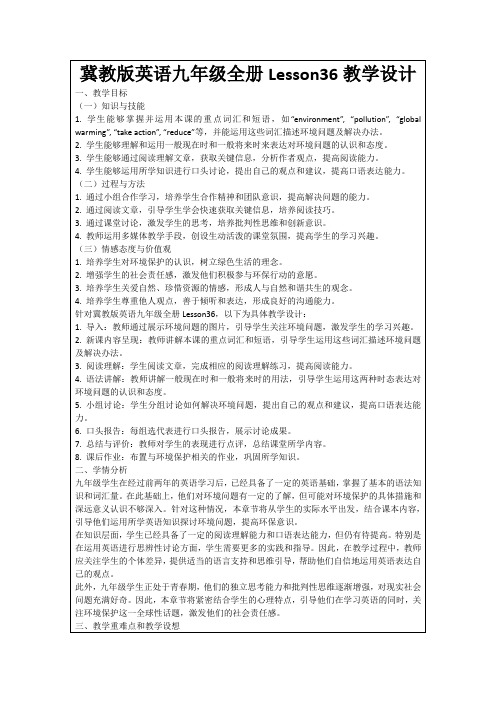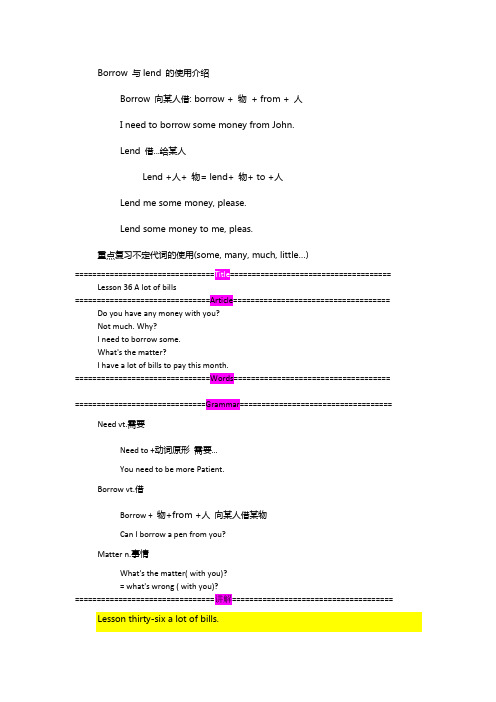lesson36
冀教版英语九年级全册Lesson36教学设计

此外,九年级学生正处于青春期,他们的独立思考能力和批判性思维逐渐增强,对现实社会问题充满好奇。因此,本章节将紧密结合学生的心理特点,引导他们在学习英语的同时,关注环境保护这一全球性话题,激发他们的社会责任感。
a.利用多媒体教学手段,如图片、视频等,形象直观地展示环境问题,提高学生的学习兴趣。
b.采用任务型教学法,设计各种实践活动,让学生在实际操作中运用所学知识。
c.注重启发式教学,引导学生主动思考、提问,培养批判性思维。
d.课后辅导:针对学生在课堂上的表现,教师进行个别辅导,帮助他们巩固所学知识。
四、教学内容与过程
7.总结与评价:教师对学生的表现进行点评,总结课堂所学内容。
8.课后作业:布置与环境保护相关的作业,巩固所学知识。
二、学情分析
九年级学生在经过前两年的英语学习后,已经具备了一定的英语基础,掌握了基本的语法知识和词汇量。在此基础上,他们对环境问题有一定的了解,但可能对环境保护的具体措施和深远意义认识不够深入。针对这种情况,本章节将从学生的实际水平出发,结合课本内容,引导他们运用所学英语知识探讨环境问题,提高环保意识。
2.通过阅读文章,引导学生学会快速获取关键信息,培养阅读技巧。
3.通过课堂讨论,激发学生的思考,培养批判性思维和创新意识。
4.教师运用多媒体教学手段,创设生动活泼的课堂氛围,提高学生的学习兴趣。
(三)情感态度与价值观
1.培养学生对环境保护的认识,树立绿色生活的理念。
赖世雄美语从头学初级篇Lesson 36学习笔记

Borrow 与lend 的使用介绍Borrow 向某人借: borrow + 物+ from + 人I need to borrow some money from John.Lend 借...给某人Lend +人+ 物= lend+ 物+ to +人Lend me some money, please.Lend some money to me, pleas.重点复习不定代词的使用(some, many, much, little…)===================================================================== Lesson 36 A lot of bills===============================Article==================================== Do you have any money with you?Not much. Why?I need to borrow some.What's the matter?I have a lot of bills to pay this month.===============================Words==================================== ==============================Grammar=================================== Need vt.需要Need to +动词原形需要…You need to be more Patient.Borrow vt.借Borrow + 物+from +人向某人借某物Can I borrow a pen from you?Matter n.事情What's the matter( with you)?= what's wrong ( with you)?================================讲解===================================== Lesson thirty-six a lot of bills.Hello this is Peter Lai again. Very happy to be on the air. Now let's open this book to page one hundred fifty-seven. Page one hundred fifty-seven on this page we can see lesson thirty-six "A lot of bills."A lot of 后可以放复数名词或不可数名词.He has a lot of money. I have a lot of time.He has a lot of friends.而否定要用much.He doesn't have much money. = he doesn't have a lot of money.而肯定句尽量用a lot of.否定句用a lot of, much都可以He doesn't have much time. 他没有许多的时间.不要用在肯定句:He has much time. He has much money. 错错错.Much 多与not 并用在否定句中Bill 是可数名词" 账单"A bill. Two bills. Many bills.Part on reading.I feel sorry for Al. 我对al表示难过.This is a dialog between a boy by the name of Al and a girl by the name of Sue. Al 和Sue的对话.Al doesn't have much money. I feel sorry for him.他钱不多,我为他感觉难过.I feel sorry for you, John. 我为你感到难过.Do you have any money with you?any用在否定句或疑问句中后放可数不可数名词. 同时放单数,复数都可Do you have any friend/ friends?No, I have no friend/ friends. No后也是可以放单数或复数名词Yes, I do. Have ten dollars with me. 我有10块钱(在身上)With 在be动词后也有用法.She is with Peter now. 他现在跟皮特在一起. (这表示他以前和别人一起的). Now she is with Peter.I don't like to be with him. 我不喜欢和他一起.He doesn't study, he is not a good student. I don't like to be withhim. 他不是五道杠学生,我不喜欢和他一起.How much money do you have with you? 你有多少钱在身上?much用于不可数,many用于可数.How many friends do you have? (没有with you)你有多少朋友?I have twenty dollars with me. 我身上有20块钱.Not much. Why?Yes, I do. But I don't have much money with me. 这简化出来的.Do you have any friends? 你有没有朋友啊?Yes, I do, but I do not have many friends. 我有但不多.Why do you ask me such a question? 你为什么问这狗屁问题?Why 也等于what for.I need to borrow some.Need 的用法之前有介绍过,与want 差不多.我们来复习一下Need to +动词原形. You need to be more careful.你需要更小心.Need +人/物: I need you.我需要你. I need some food.Need + 人+ to +动词原形:I need you to go away.我要你滚蛋.还有need与want的分别记得吗?Need 翻译: 需要(更强烈). Want 翻译: 想要(无可无不可). 在一些情况下可相互代用.I need to 在这等于I want toI want to borrow some.I need to write a letter. I want to write a letter.Borrow 借Borrow +物+ from +人I need to borrow twenty dollars from him.我要跟他借20块.Don't borrow money from him. 不要向他借钱.Lend. 把……借给…Lend + 人+ 物(这有点像授予动词吧)= Lend +物+ to +人不要借钱给他(他从来不还的)Don't lend him any money.Don't lend any money to him.原句写的borrow some 是省略,原句应该是:I need to borrow some money from you.What's the matter?matter在这虽然是名词,但当成形容词用.= wrong.You are wrong. You give me the wrong answer.你错了,你给了我错误的回答.Two and two are four.You are right. 你太聪明了.What's the matter? = what's wrong?What's wrong? Lady.There is nothing wrong/ (the matter).nothing大家还记得: 他的形容词要放后面修饰.这里一样可以放the matter.证明看起来是个名词,实际当形容词用.There's nothing wrong with me.我没问题.他出什么问题了: there is something wrong with him.There is something the matter with him.I have a lot of bills to pay this month.时间副词:To pay this month.看起来好像是: 付这个月. 其实不是This month虽然也是个名词样,但当成时间副词用的. 也可以放在句首This month I have a lot of bills to pay.This +时间名词前面都不需要加介词 .I'll be very busy this week. 这个星期我会很忙.This year I'll be very busy. 今年我会很忙.(这下完了)Pay 支付You should pay the money.你要付这笔钱.You should pay the bill. 你要付这个账单 .轮到你付账了It is your turn. 轮到你啦.It's your turn to pay the bill.练习:Marry is crying.What's the matter with her?What's wrong with her?She doesn't have money.She doesn't have much money.Can you lend me ten dollars?Can you lend ten dollars to me?Don't borrow any money from him.===============================Practice=================================== 这里主要复习不定代词There are ____ pencils on the table.A few, much, little, a little.这里很明显,pencils是复数,所以一下就排队了3个Much 很多. 修饰不可数. 而且用于否定句.Little 没有多少.修饰不可数A little, 有一些. 同样修饰不可数There is little time left. 没剩下多少时间了.There is still a little time. 还有点时间.Few,修饰可数, 没多少A few 有一些, 修饰可数我有一些朋友: I have a few friends.我没几个朋友: I have few friends.We need ____ food for the party.Many, several, a lot, lots of.Many 很多, 修饰可数Several 一些,修饰可数记得课文吗: there are several foreign students in my classA lot of, 很多, 修饰可数不可数Lots of, 就等于a lot of. 但注意看,这里面的选择,没有of.He has a lot of friends. == he has lots of friends.He has a lot of money. == he has lots of money.How ____ students are in the room?Much, few, many, a few.这里how开头表示多少的的疑问句,只有how much/ how many而much问不可数,many 用在可数,所以...There is ____ juice in the refrigerator.Lots, a little, a lots of, many.上面现在都解释过了,所以接下来的应该会了There are many students in the classroom.There are ____children playing in the yard.A little, much, several, severals.There is something ____ with Fred.Matter, the matter, the wrong, what's wrong.这里复习the matter, wrong的使用. wrong是形容词不加冠词================================others===================================。
新概念英语第3册课程讲义Lesson36

Lesson 36 A chance in a millioncredulous ['kredjələs]adj. 轻信的Anna is so credulous that she’ll believe anything you tell her.naïve“cred” = believecredit n. 信用;赊账credit card credulousincredulous credibleincrediblecredentials n. 证书;证件obscure [əb'skjʊə(r)]adj. 不起眼的,不出名的;难以理解的obscure: 1. unknown; little-knownan obscure little villagean obscure maidservantremain obscureThe environment is obviously important, but its role has remained obscure.well-known; famous; noted; notable; eminent; celebrated;renownedobscure: 2. hard to understandVery few people could understand his lecture because it was very _____.(A) faint (B) obscure(C) gloomy (D) indefinitepresume [pri'zju:m]v. 假定,推测,认为From the way they talked, I presumed (that) they were a couple.be presumed dead / innocent …A long-lost brother, who was presumed dead, was really alive all the time and wickedly plotting to bring about the hero's down-fall.You are presumed innocent until you are proved guilty.believe think suppose assume… a German taxi driver, Franz Bussman, found a brother who was thought to have been killed twenty years before.Everyone went to the funeral, for the 'ghost' was none other than Eric Cox, a third brother who was supposed to have died as a young man.be under the impression that …还以为……Though the crew were at first under the impression that the lost ship had been found, the contents of the chest proved them wrong.take it for granted that …想当然地认为……You ca n’t take it for granted that the children will behave themselves.plot [plɒt]v. 秘密谋划,暗中策划plot to do = scheme to doThe criminal was plotting / scheming to rob the bank.conspire to doThe criminals were conspiring to rob the bank.Bad weather and car trouble conspired to ruin our vacation.resemblance [ri'zembləns]n. 相似resembleShe closely resembles her mother in every way.resemblancebear a resemblance to …Your school may have done away with winners and losers, but life has not.In some schools they have abolished failing grades; they'll give you as many times as you want to get the right answer. This doesn't bear the slightest resemblance to anything in real life. acquaint [ə'kweɪnt]v. 使熟悉或了解be / get / become acquainted with …I’m not acquainted with him.He became acquainted with the work.be / get / become familiar with …He was familiar with the work.The work was familiar to him.acquaintanceHe is my only acquaintance in the little town.reunite [ri:ju:'naɪt]v. 使团聚be reunited with …The lost children were reunited with their parents.reunifyreunificationnational reunificationI'd love to buy a Rolls-Royce, but it costs an arm and a leg.Everybody was clapping their hands off.I didn’t sleep a wink last night.He has a skeleton of a wife.We are less credulous than we used to be.We spend more time traveling than we used to.less + adj. / adv. + than …not so / as + adj. / adv. + as …We are not so / as credulous as we used to be.造句:他不像以前那么内向(introverted)了。
图说英语新概念英语第三册课文音标版讲义lesson36

巴斯曼如何找到了据信已在20年前死去的兄弟的事。
巴斯曼如何找到了据信已在20年前死去的兄弟的事。
While on a walking tour with his wife, he stoppedto talk to a workman.
ˈmɒdən ˈriːdəz wʊd faɪnd sʌʧ nɑːˈiːv səˈluːʃᵊnz ˈtəʊtli ˌʌnəkˈseptəbᵊl.
现代读者会觉得这种天真的结局完全无法接受。
现代读者会觉得这种天真的结局完全无法接受。
Yet, in real life, circumstances do sometimes conspire to bring about coincidences which anyone but a nineteenth century novelist would find incredible.
jet, ɪnrɪəllaɪf, ˈsɜːkəmstənsɪzduːˈsʌmtaɪmz kənˈspaɪə tuː brɪŋ əˈbaʊt kəʊˈɪnsɪdəz wɪʧ ˈenɪwʌn bʌt ə ˈnaɪnˈtiːŋθ ˈsenʧʊri ˈnɒvəlɪst wʊd faɪnd ɪnˈkredəbᵊl.
ˈriːdəz ˈhæpɪli əkˈseptɪd ðə fækt ðæt ən əbˈskjʊə ˈmeɪdˈsɜːvənt wɒz ˈrɪəli ðə ˈhɪərəʊz ˈmʌðə.
当时的读者却愉快地接受这样一些事实,一个低贱的女佣实际上是主人公的母亲;
lesson36新概念第二册第36课

描述表达2的详细内容。
表达3
描述表达3的详细内容。
词汇扩展
01
02
03
词汇扩展1
描述词汇扩展1的详细内 容。
词汇扩展2
描述词汇扩展2的详细内 容。
词汇扩展3
描述词汇扩展3的详细内 容。
03
语法点解析
重点语法结构
过去进行时
表示过去某个时间正在进 行的动作,常与when引导 的时间状语从句一起使用。
语法练习
总结词
时态和语态
详细描述
通过时态和语态的练习,学生可以深入理解英 语语法的规则,提高句子结构的பைடு நூலகம்确性。
总结词
从句和句子结构
详细描述
通过从句和句子结构的练习,学生可以更好地组织 语言,使表达更加清晰和有条理。
复杂句子的简化
总结词
详细描述
通过复杂句子的简化练习,学生可以提高阅读理解能力 ,更好地理解英语文章。
被动语态
表示主语是动作的接受者, 常用于描述客观事实或强 调动作对主语的影响。
情态动词
表示推测、可能或必要的 意义,如may、might、 should等。
难点语法解析
过去进行时与一般过去时的区别
01
过去进行时强调过去某个时间正在进行的动作,而一般过去时
则表示过去某个时间已经完成的动作。
被动语态与主动语态的转换
新概念第二册第36课
• 课文内容概述 • 词汇和表达 • 语法点解析 • 课文中的文化知识 • 练习与巩固
01
课文内容概述
课文主题
• 课文主题为“The double life of Alfred Bloggs”。讲述了阿 尔弗雷德·布洛格斯(Alfred Bloggs)的双重生活,他在白天 是一名普通的办公室职员,而在晚上则是一名活跃的业余拳击 手。
Lesson 36 Across the Channel(横渡英吉利海峡)

Inverted Sentence 倒装句
【种类】 1. 全部倒装:谓语动词放在主语之前。 2. 部分倒装:将谓语动词的一部分 (助动词/情态动词)放在主语之前。
Inverted Sentence 倒装句
【用法分析】 1. 全部倒装:谓语动词放在主语之前。
1) here, there, now, then, thus等时间和地点副词置 于句首时: There goes the bell. Here is your letter. There are some students reading in the library. 2) 表示运动方向的副词谓语句首,谓语动词为表示位 置移动的动词时: Up went the basketball. In came the teacher.
nverted Sentence 倒装句
【用法分析】 2. 部分倒装:将谓语动词的一部分 (助动词/情态动词)放在主语之前。
1)否定型:如果将never, seldom, rarely, little, hardly, scarcely, no sooner, no longer, nowhere 等含有否定意义 的副词若位于句首,则其后的句子要用部分倒装: I never saw him again. Never did I see him again. He seldom goes out for dinner. Seldom does he go out for dinner. He little realized the danger he faced. Little did he realize the danger he faced.
陈述句中的谓语动词为实意动词时如果时态是一般现在时则要在句首加does或do构成疑问句如果时态是过去时则要在句首加did构成疑问句两种情况构成的疑问句实质都是部分倒装句
新概念英语第二册 Lesson36

• aim to do sth 打算做某事
• I will do sth=I intend to do sth
总结:
• plan to do / mean to do / aim to do / hope to do / want to do 这类词本身没有将来时态, 本身就 表示将来, 用一般现在时表示将来时
Listen to the recording and answer: 听完看
1. What’s the swimmer’s name? Debbie Hart
2. How old is she? only eleven years old 3. How often will she take rests? every two hours 4. What will she eat during the time she swims across the Channel? She will have something to drink but she will not eat any solid food. 5. Where will her friends wait for her? on the English coast
第4剑--画中有话(每句欣赏)
• 【课文讲解】
• 1、Across the Channel • across 横渡 • the Channel=the English Channel 英吉利海
He succeeds in arriving in H.K.
He is successful in arriving in H.K. • fail v. 失败 • fail to do sth. 做……失败 • failure[ˈfeɪljə(r)] n. 失败, 失败者, 缺乏,
新概念英语 第二册 Lesson 36

◆ anxiously adv.焦急地,忧虑地 ['æŋkʃəsli] Are you all right?“ he asked anxiously. anxious adj. 挂念的,忧虑的 an anxious look I' m anxious about her health. 渴望的,盼望的 be anxious for 渴望某事 We are anxious for your safe return. be anxious to do sth 渴望做某事 be anxious for sb to do sth 渴望某人做某事 She was anxious for them all to leave the room. nervous 紧张的 worried 焦急的,担心的
lesson 36 Across the channel
The English Chaቤተ መጻሕፍቲ ባይዱnel
位于英国和法国之间,沟通大西洋与北海的重要 国际航运水道。
【New words and expressions】 record n. 记录 strong adj. 强壮的 swimmer n. 游泳运动员 succeed v. 成功 train v. 训练 anxiously adv. 焦急地 intend v. 打算 solid adj. 固体的,硬的
◆ record 1)n. 记录,记载 a record of sth 对…的记录/记载 a record of accidents set up a new world record= a new world record = make a new world record 创记录 keep a record/hold a record 保持记录 break a record/beat a record 打破记录 2)n. 唱片 a pop record 通俗歌曲唱片 a hit record 流行歌曲唱片 put on a record of Mozart 放莫扎特的唱片 3)n. 成绩,经历,前科 a school record 学习成绩 a police record 前科 4)v. 记录,写下,录音(影) His speech was recorded on a tape. 他的演讲被录在了磁带上。 recorder n. 录音机,录像机 tape recorder 录音机
- 1、下载文档前请自行甄别文档内容的完整性,平台不提供额外的编辑、内容补充、找答案等附加服务。
- 2、"仅部分预览"的文档,不可在线预览部分如存在完整性等问题,可反馈申请退款(可完整预览的文档不适用该条件!)。
- 3、如文档侵犯您的权益,请联系客服反馈,我们会尽快为您处理(人工客服工作时间:9:00-18:30)。
Leçon 36TEXTESI. UNE VILLE EN PERSPECTIVE——Je vois que les travaux avancent sur ce chantier. Qu’est-ce qu’on va construire ici ? Une cité ?——Une usine, une cité, et d’autres choses encore. Je viens de parler avec l’un des architectes qui travaillent ici. C’est un projet très important et il faudra plusieurs années pour le réaliser.——De quel projet s’agit-il ? Il y a six mois, il n’y avait que des champs et des fermes, et maintenant je vois des grues, des machines et des ouvriers un peu partout.——Eh bien ! On a décidé d’intaller ici une usine de construction automobile. C’est très important pour la population locale car il y aura du travail pou r trois mille personnes.——Ce sera la plus grande entreprise de la région !——C’est vrai. Actuellement, les architectes ont fini les derniers plans et le ministre viendra visiter le chantier. On construira aussi une ville nouvelle, qui occupera une surface de deux cents hectares. Il y aura un grand ensemble où pourront vivre cinq mille personnes. Soixante pour cent des employés de l’usine y habiteront. Les immeubles auront dix étages et toutes les salles de séjour seront exposées au sud. Au milieu, il y aura un centre commercial, un stade, un hôpital et des jardins pour les enfants. Il paraît que l’architecture sera ultramoderne.——Mais il y aura des problèmes de transports. La gare est à plusieurs kilomètres. Pourquoi ne construira-t-on pas tout cela ailleurs ?——On dit que c’est un bon emplacement. Bien sûr, il faudra prévoir de nouvelles routes et un service d’autobus. Mais quand l’autoroute Lyon-Grenoble sera ouverte à la circulation, les choses seront plus simples. Regarde, tu vois ce chantier, il sera occupé dans deux ans par les bâtiments administratifs.——Et où mettra-t-on l’école ?——Je pense qu’elle sera située près des jardins et du stade, ce qui permettra aux enfants de faire du sport. Imagine que dans cinq ans tu verras ici une ville entièrement nouvelle. Je regretterai la campagne et les fermes. Les paysans deviendront des ouvriers. Ils auront des vacances et moins de liberté. Ils seront mieux logés mais ils passeront quarante heures par semaine àtravailler àla chaîne, enfermés dans des ateliers. Seront-ils plus heureux ? Enfin, c’est le progrès.VOCABULAIREen perspective adv. in perspectivele chantier construction sitel’architecte m. architectle projet projectréaliser vt. to realizes’agir (de)v. 有关于la grue craneinstaller vt. to installlocal-e (pl. aux) a. localactuellement adv. now, at presentle plan planle ministre ministernouveau a. newoccuper vt. to occupyle grand ensemble (同一建筑式样的)居民点l’immeuble m. 大楼,房屋l’étage m. floorexposer vt. 使(房屋)朝向le sud southcommercial-e a. commerciall’hôpital m. hospitalle stade stadiuml’architecture f. architecturele transport transportailleurs adv. elsewherel’emplacement m. sitel’autoroute f. highwayouvert-e a. openle bâtiment buildingle sport sportentièrement adv. entirely, whollyregretter vt. to regretpaysan-ne n. peasantla libertéliberty,freedomloger vt. to lodgela chaîne chainenfermé-e p.p. 被关闭的le progrès progressII. L’O E UF DE CHRISTOPHE COLOMB Christophe Colomb dînait un jour chez les Espagnols. Quelques-uns des convives, jaloux de sa gloire, cherchaient à diminuer son mérite.——Découvrir l’Amérique, disaient-ils, ce n’était pas une chose difficile, il ne fallait qu’y penser.Colomb, sans répondre, prit un oeuf et s’adressa à ses voisins :——Quel est celui de vous, leur disait-il, qui connaît le moyen de faire tenir un oeuf debout sur l’une de ses extrémités ?Chacun essa ya, mais personne ne réussit. Colomb prit alors l’oeuf, le frappalégèrement sur son assiette et l’o e uf resta en équilibre.Sur ce, tous s’écrièrent :——Cela n’est pas difficile !——C’est vrai, répliqua Colomb avec un sourire, mais il fallait y penser ! VOCABULAIREEspagnol-e n. Spaniardconvive n. guest (at table)jaloux-se a. jealousle mérite meritle moyen means, wayl’extrémité f. extrmity, endréussir vi. to succeedfrapper vt. to strike, to hitl’assiette f. platel’équilibre m. equilibriumrépliquer vt. to retortDIALOGUE——On commence les travaux dans deux mois.——Tu sais, la vie en province, je n’aime pas ça.——Mais ce n’est pas le bout du monde ; on peut venir à Paris de temps en temps et la vie en prov ince a beaucoup d’avantages: le sport, la nature … et puis, il y a plus d’argent, deux mille francs de plus par mois ; le logement sera gratuit.——Et si je ne trouve pas de travail ?——Il y a des hôpitaux là-bas ; ils ont besoin de bonnes infirmières.——M oi, c’est sûr. Je n’y vais pas.——Comment ça, tu n’y vas pas. Alors, qu’est-ce qu’on décide ? VOCABULAIREgratuit-e a. gratuitous, freel’infirmière f. (hospital) nurseGRAMMAIRE时态配合:从句主谓语时态与主句的配合使用1.主句谓语现在时,从句谓语有以下一些情况:现在时:La jeune fille dit que son fiancé dirige l’orchestre.复合过去时:Je veux savoir pourquoi tu as consulté ton avocat.未完成过去时:Le jeune homme répond qu’il était employé chez un marchand de glaces à ce moment-là.简单将来时:Je ne sais pas si elle ira encore dans ce petit cinéma.2.主句谓语过去时,从句谓语有以下一些情况:未完成过去时:Mme Lamy disait que la situation était plus complexe qu’avant. 愈过去时:Mon père a expliquéj’avais appris àparler comme un perroquet.过去将来时:Paul demanda si l’on ferait un pique-nique à mi-chemin.。
